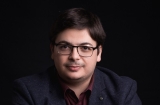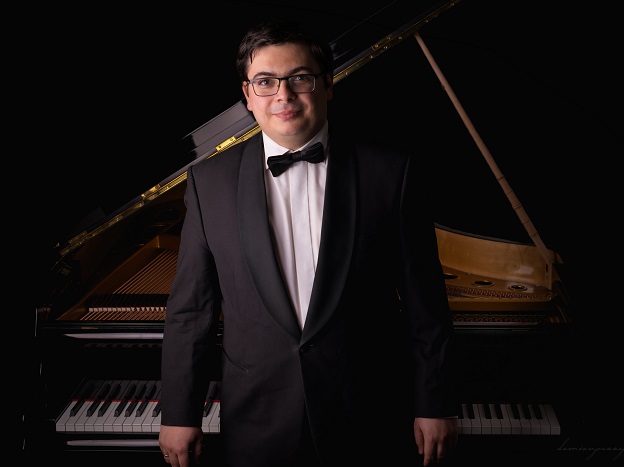Mr. Ivanov, if we look at your biography, we can find many superlatives there: You started playing the piano at the age of four, you have participated in more than 50 piano competitions and given 32 piano recital concerts internationally in 2016 alone, a number that has certainly increased since then. Is playing in front of an audience the key to your development as an artist? At least it seems to have been crucial for your career so far.
Playing in front of an audience has always been a pleasure for me. Even the preparation of a program, knowing that it will be performed in the concert hall, is a very inspiring process for me – I have enough time to think about how exactly I want to play each piece or passage so that the audience always gets an unforgettable experience: every performance has to be effective and brilliant, otherwise it doesn’t make sense to me. Whether playing in front of an audience is the key to developing as an artist… – well, yes of course, it is part of it. But the greatest development should still take place in the childhood of every artist, so that you can have fun with music in your ‘strongest »‘ years – that’s when musical and especially technical skills need to be learned properly.
So how do you deal with the current time of restrictions on public concerts in times of the Corona crisis? That must be wearing for you.
Economically speaking, the Corona crisis is not easy for any artist to cope with. On the one hand, for many, the lockdown of the concert halls meant that no income could be generated, and for some it also led to a kind of depression. During this time, not only engagements were lost, but also contacts to various organizers and future projects. On the other hand, this time also offers the opportunity to either deteriorate one’s artistic level by not spending enough time with the instrument at home due to a lack of motivation, or, quite the contrary – one finally finds the time to study new repertoire and looks for new ways to present oneself. Firstly, I have offered sponsors within my audience, who also wanted to support me financially, to dedicate compositions to them, and thus I have had a good time with my creativity; secondly, I have also concentrated on some piano concertos and the Nocturnes by Chopin, which I would like to record in autumn. Thirdly, I have fulfilled myself a long-standing dream of founding a recording studio that will allow me to distinguish myself both as an artist and as a sound engineer.
You have been very active in the recording studio for some time now. How do you feel about the process of recording an album compared to a live concert? Do you find it positive because you can take your time to record the ideal interpretation or do you lack feedback with the audience?
The recording process is a different way of making music. It’s not a concert or competition, and it’s not like practicing at home. I see a recording as the only way to ‘store’ an artist’s repertoire and document it for posterity in the archive. Therefore, patience and very precise preparation are required above all to achieve the ‘ideal’ interpretation.
Since 2017 you have presented a new album every year via the Viennese label Gramola. It is noticeable that so far you seem to focus entirely on the romantic piano repertoire. Would you say that the romantic piano music is your preferred genre?
There is no question that I am particularly fond of the music of the Romantic period. It, above all, touches the taste of many people very directly and thus allows an artist to show a high degree of creativity and individuality. On the other hand, a repertoire such as Schumann’s Novelleten, Liszt’s Paganini Etudes or the Hungarian Rhapsodies presents a technical challenge: despite its difficulties, this music should always sound ‘young and fresh’. Therefore, I think that now is the right time for me to deal with these piano pieces, even if they are not so frequently recorded.
At the same time, my repertoire includes not only music of the Romantic period, but also everything that belongs to the important piano literature from the baroque to the 20th century. As an example I may mention here the 32 sonatas by Beethoven which I plan to record successively in the upcoming years.
With your Chopin and your Schumann albums you have explored works that are undoubtedly among the masterpieces of piano music, but which are mostly overshadowed in the oeuvre of the two composers by even better known compositions. With your first Liszt album last year, this has changed, and you have released, among other things, the great B minor Sonata, now followed by the equally masterful Hungarian Rhapsodies, which are very popular with the audience. So do your CD albums also reflect your development as an artist?
I don’t think that the order of release of my CD albums has anything to do with my development as an artist. The music I have recorded so far includes piano compositions that I like very much and of which I wanted to record my own interpretation on CDs.
However, what I realized even before my first record was that I would always have to dedicate an entire album to a certain genre of a composer in order to release an important CD, and this has always been the case since then. This alone has certainly influenced my artistic development, as it has helped me to see music from a larger perspective.
If I may go into detail: What I find particularly inspiring is your handling of the rubato. Rubato is a high art, but many younger performers use it very freely and sometimes in excess, which can quickly get the interpretation out of hand. You, on the other hand, seem to have thought about rubato in a precise way and use this stylistic device with great confidence and tact. What do you usually advise your piano students to use rubato?
The topic of rubato can certainly be discussed intensively by many artists and musicologists, and I suspect that somewhere there is a precise theoretical definition of how to play rubato correctly. But to be honest, I have never thought about that. Above all, it must be played naturally – in such a way that it does not destroy the character, tempo and line of the musical phrase. In principle, this is much easier said than done.
You studied first with your mother and Sultana Markovska, then with the legendary Oleg Maisenberg. How do the personalities of your teachers differ and to what extent has this influenced you musically?
The training of an artist is divided into several phases, and of these, the first phase, in which the hands of a future pianist are placed on the piano for the first time, is the most important. During this phase, the technical training of the student is especially decisive for his later development. I am very happy that my childhood was connected with my mother and Mrs. Markovska in terms of piano lessons, because they always worked with me to achieve the maximum quality of each note. For example, I regularly worked with one of them for hours on end on just one single bar so that it would sound beautiful. I also had to start every day since I was four years old with scales in various variations. This learning process was not always easy for me as a child, but it has certainly paid off.
I really enjoyed my later training with Oleg Maisenberg. I came to Vienna primarily because of him. He is a great artist who always expressed himself in a simple but very meaningful way, and he always motivated me to expand my repertoire and prepare a new piece every week. After he retired, I decided to work exclusively on my own and to continue my training myself.
In your style I find many virtues, among which I would especially emphasize authenticity, personality, character and faithfulness to the score. In a very positive sense, your interpretations seem to me almost fallen out of time: While many of your young colleagues nowadays seem to be trying to find new ground, to present interpretations deviating from the supposed « norm » and especially « revolutionary » ones, you always give the impression that you consciously try to follow in the footsteps of the great school of pianists like Gilels, Rubinstein or Serkin. How do you see yourself in our fast-moving times and in this extremely diverse piano scene of today? Or in other words: how would you like to be seen?
My opinion has always been that a musician’s way of performing must always be convincing. No matter what you do, you should always try to avoid boredom. Unfortunately, that doesn’t happen very often nowadays. Many are afraid of creativity and their own personality and therefore try to play everything perfectly and without risk or wrong notes. But a wrong note is not always bad! It shows that this artist is a human being.
It goes without saying that all artists go their own way and all want to develop in the best possible way. It is most important to me never to lose love and honest emotion for music, because it lives from it.
On the Internet you can find a quite incredible live performance of Balakirev’s « Islamey » by you (link) . Would that be something you would like to record sometime? Maybe in connection with a Russian album?
Good idea!
Pizzicato: Finally – despite the Corona crisis – the question: are there any concerts or other plans in the near future?
I have many concerts and other plans ahead of me and I hope that the Corona crisis will be over soon so that they can take place. I am also on my way to start my own festival in Austria and when the world is hopefully running normal again from next year on, I am expecting to perform in several European countries.























